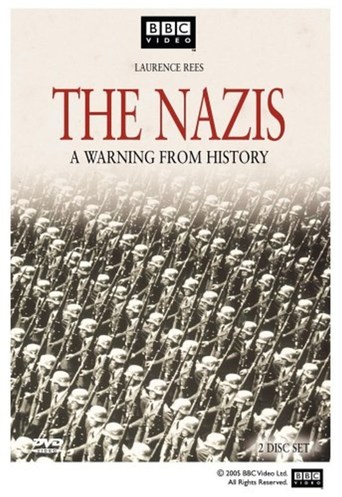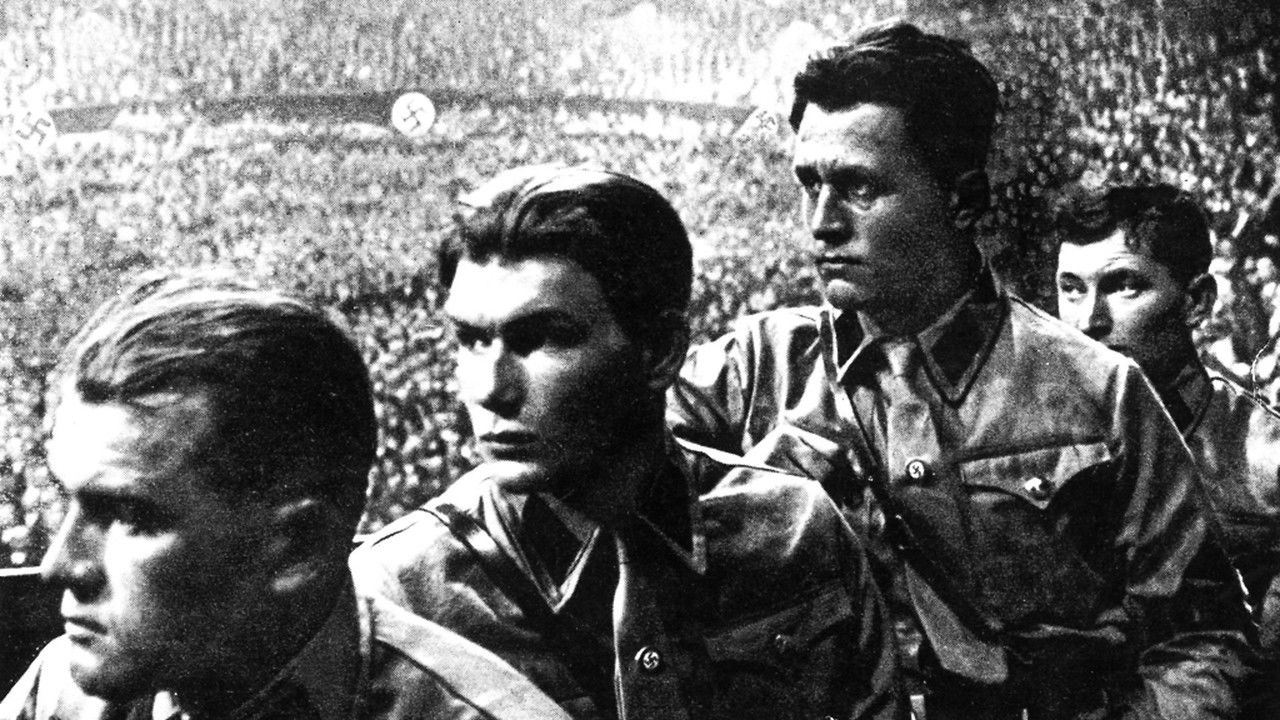mharlos
I just finished re-watching this series on DVD (I had previously seen it telecast about 15 years ago).The warning -- that is, the lesson of Nazi history -- is only explicitly addressed for a brief moment. But at the same time, it is vividly present throughout, and I think will be especially valuable for younger viewers who are likely to know very little of the story of those times. It is not presented as a chronology of the war, but it rather succinctly (in less than five hours) gives a clear depiction of the descent into depravity.The series also offers some historical theses: first and foremost, that because the Nazi regime was so much dominated by its single charismatic personality, and because he was a visionary much more than a leader, what went on within the regime was often chaotic and confused (despite Nazism portraying itself as the paragon of order and efficiency).For me, the most memorable and valuable distinction of this documentary is its collection of interviews with people (all elderly by the time of interviewing in the 1990s) who participated in the persecutions. Often, documentaries about the Nazi regime have interviews with people who were passive witnesses, or resisters against the regime who had less cause to fear disclosure of their actions and less to feel ashamed of. I used to watch every documentary in English I could find on WW II, and never saw perpetrator interviews like these. And because of the age of the people involved in those times, I doubt that anything like this could have been accomplished since.Very stark for me is a meeting (on a park bench) with the author of a letter of denunciation which, along with several other such letters, led to the death of young German woman, for the crime of "being different." The calm (and yet surreal) conversation about this letter, more than 50 years after the event, offers a profoundly disturbing look into the face of evil.
browna-mail
Another great series on European war, one of the best. I wish African history and other wars benefited from such detail and dedication to the truth. The creeping evil of the Nazi regime, German fear and hatred should make all following generations careful where they put there trust and dwell in hate of others, believing in superiority of race, culture, religion, politics and technology. It's a pity in the following years the Jewish victims of such evil hate via the state of Israel have not taken some of these lessons to heart to avoid perpetuating hate and abuse themselves. The truth is made clear that Hitler's evil was shared amongst many and grew from perpetuating fear, but it did not end, it became a template in degrees for others worldwide who exercise power. This series with great care shows in true detail how so many lost so much to such savage evil, I weep for all who suffered then in ghettos and gas chambers and suffer now to missiles, bombs and slow suffocation of freedom. This documentary is a warning indeed, I prey we heed its message one day because the sacrifice of the lives documented on film here should have led to a better world for all.
Global_Marketing_Pros
I think this is an excellent film to document history. How can one culture dominate with a military might so briefly but so effectively. Taking human nature to the limits of ideologies. Does this documentary mirror socialist nations of singular culture such as Saudi Arabia, Russian Federation, United Kingdom, Japan, and or China? When does the balance between singular nationalist government and cultural identity shift to where political power becomes a cast system under a singular ethnicity? This film documents that very question being exercised within the Prussian culture. Which I dare to say never really changed due to geo-graphical barriers that are leading walls to isolation with geo-cultural norms such as language, trade and commerce. These are the same barriers as can be seen for the United Kingdom, Japan, and China. The exceptions are Russia which chooses a nationalist direction and the United Kingdom which identifies commerce as bartering tool for bi-lateral communication to circumvent geo-cultural barriers.Thus, this film accurately documents the development of nationalist power shift in politics and undermining of a diverse Prussian ethnic demographics to harness full control to a singular ethnic class. The "Nazi" became what the design intended culturally and politically. The military science of "Nazi Germany" is detached from this documentary as needed to be a proper cultural document.
Theo Robertson
I first saw THE Nazis: A WARNING FROM HISTORY when it was originally broadcast on BBC 2 in 1997 but wasn't too struck by it . I found it somewhat dry and academic and unlike several documentaries dealing with the holocaust ( Most notably the episode from THE WORLD AT WAR ) it didn't leave much of an impact with me . I also noticed some irritation with the writing , for example the phrase " Ethnic cleansing " is used but this is both an anachronism and a misnomer . Anachronistic because the term wasn't used until 1991-92 during the Balkans conflict and a misnomer because what the Serbs , Croats and Bosniaks ( All sides used the technique and no one had a monopoly as perpetrator or victim ) were doing in the former Yugoslavia was fairly different from what the Nazis did in the occupied territories during the second world war . " Migratory genocide " is a phrase that came from the Soviet-Afghan war and can be said to be the precursor phrase to " Ethnic cleansing " and would be accurate to describe the tactics used in the former Yugoslavia . Nazi tactics from 1939 to 1945 were different and " Literal genocide " would be the most accurate phrase instead of " ethnic cleansing " I did catch the final episode when it was repeated a couple of weeks ago and I have to take issue with some of the points raised . For example Laurence Rees script argues that because the fascist policies of Italy were different from German Nazi racial policies , Nazi Germany couldn't sue for peace the way the Italians had done . This is a bizarre argument because whatever the ideology of Italy was during the second world war they had no real military success , even if Italy was led by someone as bloodthirsty and as racist as Hitler the Italian military had no military success as such , they'd captured very little territory . The Italian military leaders were incompetent and the average soldier in the fascist Italian army is still the butt of jokes today so it's totally irrelevant what the racial policies of Il Duce were . By a bitter irony the most serious critics of Hitler in Germany during were the Prussian aristocracy , the officer class whose generals conquered Western Europe and knocked on the gates of Moscow in 1941 . Without these officers who had little love of Hitler Nazi Germany wouldn't have been able to capture most of Europe and engage on a policy of industrialised murder It's also open to interpretation as to how much fighting spirit the Germans had in the final months of the war was down to the fear of being tried for their crimes against humanity or if it's down to the notorious German mentality . During the great war of 1914-18 Germany wasn't led by a genocidal madman or committed a policy of mass extermination but they still fought on when they realised they weren't going to win the war and the allies on the Western front were shocked by this attitude as the Germans fought until the final seconds before 11am November the 11th 1918 . Even today the Germans in sport are infamous as to their win at all costs mentality and there has always seemed to be something in the German psyche that doesn't allow them to know when they've been beaten Much of the selling point of the series - And the reason why it's so highly regarded by some critics - is that it interviews people who have innocent blood on their hands . One man tells of the time he was told to prosecute a farm worker who made a joke about the Nazis blowing up a bridge . The farm worker was found guilty of treason and hanged in the village square in front of his wife . The prosecutor in question was later found guilty of murder and sentenced to six years imprisonment . But what do we learn from these interviews ? That the Nazis murdered millions of innocent people ? I think we already knew that . That they're sorry for what they did ? That they're not sorry at all ? How can anyone prove or disprove that and what good would come out of it anyway ? Watching THE Nazis: A WARNING FROM HISTORY is a disappointment since it doesn't shed new light on a topic we already know about


 AD
AD
